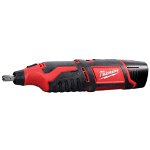Should I opt for an electric or cordless rotary tool?
It depends on how you plan to use it. If you need to work continuously and often on heavy duty, long-term projects, go with an electric rotary tool, since it has a constant power source and will be able to power you through numerous tasks. If you prefer something more portable, a cordless one will work fine. Just be prepared to charge it periodically and know that its capabilities may be limited (run-time, ease of use, etc.) with its limited power source.




